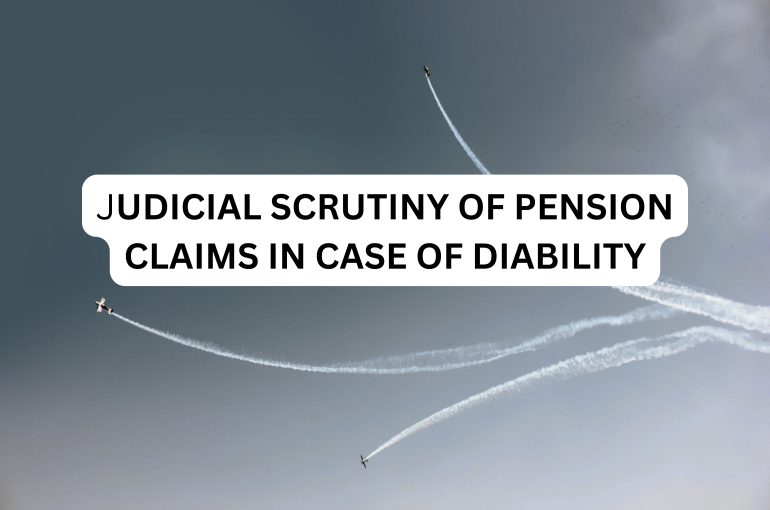JUDICIAL SCRUTINY OF PENSION CLAIMS IN CASE OF DIABILITY
Case Background:
A very interesting matter came before the High Court of Delhi titled as “Ex Sgt Laxmi Narayan Pandey Retd V. Union Of India”. The Petitioner, Ex SGT Laxmi Narayan Pandey, joined the Indian Air Force (IAF) as a Radio Technician in the year 1989. He served for over 20 years before being discharged in the year 2009, due to a disability (Schizophrenia) assessed at 30% for life.
The Petitioner first reported symptoms of uneasiness, sleep disturbances, and concentration difficulties in 1992. He was diagnosed with Schizophrenia in 1993 and was placed in a low medical category. The Petitioner’s condition was assessed multiple times, and he was ultimately released in a low medical category in 2009.
The Petitioner’s claim for disability pension was rejected by the IAF on the grounds that his Schizophrenia was neither attributable to nor aggravated by military service.
The Petitioner’s appeal against the rejection was also dismissed, leading him to file an Original Application (OA) before the Armed Forces Tribunal. The Tribunal dismissed his OA.
Aggrieved by the Tribunal’s decision, the Petitioner filed the present Writ Petition in the High Court of Delhi under Article 226 of the Constitution of India, seeking directions to the Respondents to recognize his disability as attributable to or aggravated by military service and to grant him disability pension.
Submissions made by the Parties:
It was claimed by the Petitioner that he was medically fit at the time of induction, and there was no record of any disability. He argued that the onset of Schizophrenia was due to stress and trauma experienced during his military service, particularly during his posting in a remote location in Barmer, Rajasthan.
The Petitioner further claimed that he was bitten by a snake while performing duties in 1991, which led to significant stress and eventually triggered Schizophrenia.
The Petitioner relied on the Supreme Court’s decision in Dharamvir Singh v. Union of India and Others (2013) and Union of India v. Parashotam Dass (2023), arguing that any disease or disability arising during service should be presumed attributable to service unless proven otherwise by the employer.
The Respondents argued that the Petitioner’s condition was thoroughly assessed by multiple Medical Boards, which consistently concluded that his Schizophrenia was not attributable to or aggravated by military service.
The Respondents contended that Schizophrenia, being a mental disorder, could not be directly linked to military service unless proven otherwise. The disease was deemed “constitutional in nature” by the Medical Board.
The Respondents pointed out that the Petitioner’s claim about the snake bite incident was an afterthought, as it was not mentioned during his medical evaluations or before the Tribunal.
High Court’s Analysis:
The Court emphasized that the opinion of the Medical Board, which is an expert body, should be given significant weight. The Medical Board had clearly stated that the Petitioner’s Schizophrenia was neither attributable to nor aggravated by military service and was constitutional in nature. The Court found no reason to interfere with this expert opinion.
The Court referred to the decisions in Secretary, Ministry of Defence v. A.V. Damodaran (2009) and Union of India v. Angad Singh Titaria (2015), which underscored the importance of medical opinions in determining the causality between military service and a disease. The Court found that the medical assessment in this case was consistent and justified.
The Court noted that the Petitioner had not raised the issue of the snake bite incident or service-related stress before the Medical Board or the Tribunal, suggesting that these claims were not genuine and were raised belatedly.
While the Court acknowledged the principle that a disability arising during service should generally be presumed to be service-related, it found that the consistent medical opinion in this case rebutted that presumption. The Petitioner’s condition was found to have no connection to his service.
Conclusion:
The High Court dismissed the Petition, upholding the Armed Forces Tribunal’s decision to deny the Petitioner disability pension. The Court concluded that the Petitioner’s Schizophrenia was not attributable to or aggravated by military service and was instead constitutional in nature. Therefore, the Petitioner was not entitled to disability pension as claimed.
Ashita
Associate
The Indian Lawyer and Allied Services





































Leave a Reply